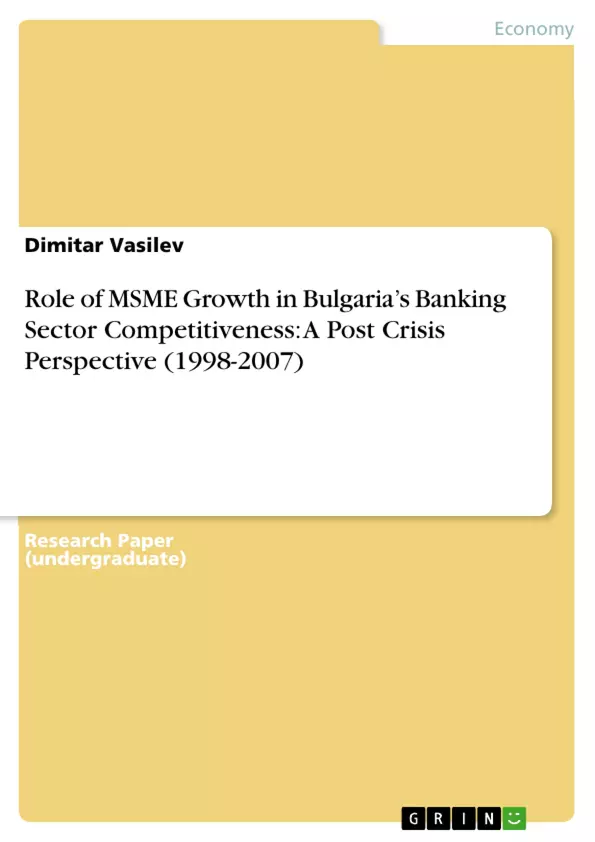enterprises (MSME) on banking sector competitiveness. In particular, it seeks to empirically establish meaningful relationships between individual corporate growth indicators and enhanced banking performance. Such indicators include but are not limited to: volume of domestic/export business; net contribution to the country’s GDP; net contribution to the country’s aggregate value added; level of innovative activity (as measured by R&D expenditure); increase in capital expenditure (e.g. tangible fixed assets). For reasons of comprehensiveness, total factor productivity (TFP) is utilized as quantitative measure of banking sector competitiveness. In light of the previous considerations, the proposed research question is:
How does MSME growth impact competitiveness in the banking sector?
Inhaltsverzeichnis (Table of Contents)
- Research Aims and Objectives
- Research Topic Background
- Methodology and Data Sources
- Expected Output, Provisional Timeframe of Activities and Other Issues
Zielsetzung und Themenschwerpunkte (Objectives and Key Themes)
This research aims to investigate the relationship between the growth of micro, small and medium-sized enterprises (MSMEs) and the competitiveness of the Bulgarian banking sector. The study seeks to identify statistically significant corporate growth indicators and empirically establish correlations between these indicators and banking sector productivity, using total factor productivity (TFP) as a measure of competitiveness. The research period focuses on the post-crisis era (1998-2007), examining the role of banking institutions in facilitating economic growth within the MSME segment.
- Impact of MSME growth on banking sector competitiveness
- Identification of key corporate growth indicators influencing banking performance
- Role of banking institutions in facilitating economic growth within the MSME segment
- Assessment of the relationship between banking sector productivity and MSME growth indicators
- Analysis of the Bulgarian banking sector during the post-crisis period (1998-2007)
Zusammenfassung der Kapitel (Chapter Summaries)
The research proposal outlines the objectives, background, methodology, and expected outcomes of a study exploring the impact of MSME growth on banking sector competitiveness in Bulgaria. The initial section details the research aims and objectives, highlighting the importance of understanding how MSME growth contributes to banking sector performance. The second section provides background information on the role of MSMEs in modern market-driven societies and the evolution of the Bulgarian economy, specifically focusing on the post-crisis period and the transition to a market-oriented system.
The third section delves into the methodology and data sources used for the research. It describes the use of secondary data from national statistical agencies, reports, and sociological surveys, along with the statistical software employed for data analysis. The theoretical framework is based on a review of contemporary literature and Bulgarian-language resources. The final section presents the expected research output, a provisional timeframe for the project, and discusses the potential implications and opportunities of the study.
Schlüsselwörter (Keywords)
The core keywords and focus topics of this research include MSME growth, banking sector competitiveness, total factor productivity (TFP), corporate growth indicators, banking performance, post-crisis era, Bulgarian economy, financial intermediation, data analysis, statistical significance, empirical research, and the Bulgarian banking sector.
Frequently Asked Questions
How does MSME growth affect banking competitiveness?
The research seeks to establish correlations between corporate growth indicators of MSMEs and enhanced banking performance, measured by Total Factor Productivity (TFP).
What are MSMEs?
MSMEs stands for Micro, Small and Medium-sized Enterprises, which are crucial for economic growth in market-driven societies like Bulgaria.
What indicators are used to measure MSME growth?
Key indicators include domestic/export business volume, net contribution to GDP, value added, R&D expenditure, and capital expenditure.
What is the significance of the 1998-2007 period in Bulgaria?
This was the post-crisis era during which the Bulgarian economy transitioned to a market-oriented system and experienced significant financial intermediation growth.
What is Total Factor Productivity (TFP)?
TFP is used in this study as a quantitative measure to assess the competitiveness and efficiency of the banking sector.
- Citation du texte
- Dimitar Vasilev (Auteur), 2009, Role of MSME Growth in Bulgaria’s Banking Sector Competitiveness: A Post Crisis Perspective (1998-2007), Munich, GRIN Verlag, https://www.grin.com/document/180773



